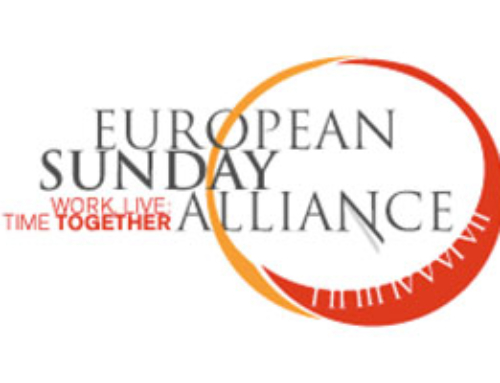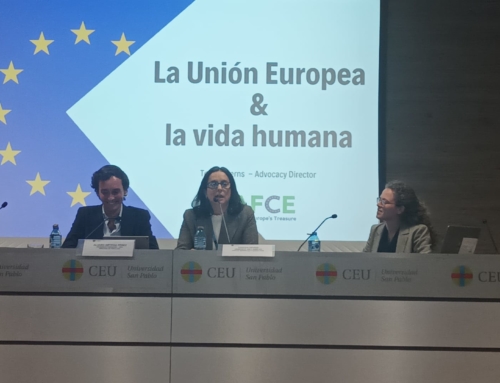Brussels, 30th May 2024
On Monday, Policy Officer Teresa Gerns intervened on behalf of FAFCE at an event at the Council of Europe. The event, entitled Education, Citizenship, Subsidiarity was held under the patronage of Marija Pejčinović Burić, Secretary General of the Council of Europe.
The conference was organised by the representation to the Council of Europe of the Union of former students of Catholic education in Europe (UNAEC), with the support of Catholic office of information and initiative for Europe (OCIPE).
FAFCE’s Policy Officer Teresa Gerns began by saying that “education is the tool to allow the child to discover his humanity, in a specific cultural and social context. Children do not grow isolated from the society, but into the smallest form of society, which is the family and where they start constructing their identity”. This echoes both a Recommendation of the Council of Europe that “the family has a paramount role in the upbringing of children, including in the choice of a religious upbringing”; as well as the Papal encyclical Rerum Novarum which stressed that “a family, no less than a state, is, as we have said, a true society”.
Reflecting on the subjects before the conference, Teresa Gerns spoke about the principle of subsidiarity. It is a core founding principle of the European Union, which safeguards national competencies of sovereign member states. Specifically, she explained the importance of subsidiarity in the context of liberty and education, parents ought to have the freedom to choose how to educate their children; which should be respected and promoted by the state.
Education is considered a national competency under the governance of member states, which is why it must be protected from centralised over-reaching from European institutions that stifles this liberty for parents. She said that “in some cases, the institutions enter to legislate or to set political directions imperative for Member States, and against the principle of subsidiarity and of proportionality, which protects the capacity of national governments to legislate on matters exclusive of their competence”.
Regarding the right of parents to elect the type of education for their children, Teresa Gerns said: “The risk in the political debates is to immediately fall into the trap of polarisation, as one or another ideology can enter into the debate and many personal stories can be very emotional, involving children and their parents. But, precisely for this dimension, the key challenges need to be observed from the perspective of families themselves”. She continues, “it’s indissociable from the responsibility linked to the fact of being a father and a mother: if we talk about rights, it’s because we first have duties and responsibilities, and not simple wishes or desires”.
Teresa Gerns also considered the cooperative role between parents and teachers. While parents have the primary and immediate responsibility for their children, teachers can also play a part in the health, safety, and development of the child. This is most evident in the family associations across Europe, so many of whom we are proud to count as FAFCE members. Networks of families combat loneliness in a challenging culture. The joyful responsibility of starting a family can be encouraged and facilitated by the support of family associations in favour of the best interests of the child.
As well as detailing contexts in several European member states, Teresa Gerns identified three key threats to subsidiarity.
- Limiting Parental Authority: Statements and policies limiting parents’ control over their children’s education undermine the family’s primary role.
- State Overreach: Restricting parental veto rights is seen as the state overstepping its role, which should support rather than impose.
- Disregarding the Common Good: Subsidiarity emphasises achieving educational goals without overriding the family’s fundamental responsibilities and rights.
Aside from FAFCE’s Policy Officer Teresa Gerns, participants included:
Monsignor Marco Ganci, Permanent Observer of the Holy See to the Council of Europe
Christophe Speckbacher, the Council of Europe’s lead on the cooperation between the Council of Europe and European civil society organisations
Gerhard Ermischer, President of the Conference of International Non-Governmental Organisations Conference (INGOs)
Louis-Marie Piron, Secretary General of the European Committee for Catholic Education (CEEC)
Daniel Guéry, Coordinator of Catholic-inspired NGOs
Isabelle Chaperon, President of the International Centre for Catholic Cooperation (CCIC)
Roseline Moreau, Representative of the International Office of Catholic Education (OIEC)
Josyane Zingg, Delegate of the International Organisation for the Right to Education and Freedom of Education (OIDEL) to the United Nations
Laurent Grégoire, President of the French Federalist Movement
Teresa Gerns focuses on policy matters that relate to the Council of Europe and is often working for FAFCE from Strasbourg.







